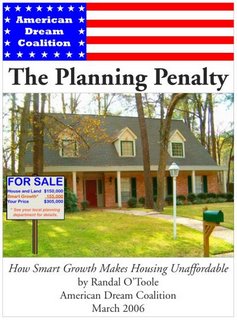 The busybody nostrums of town planners are slowly being seen for what they are: restrictions on people's lives; an insistence that people live as planners wish them to, rather than as they might choose for themselves -- and the planners' restrictions are adding enormous extra costs to housing. Two recent articles confirm that view, one from San Francisco and one from Boulder, Colorado.
The busybody nostrums of town planners are slowly being seen for what they are: restrictions on people's lives; an insistence that people live as planners wish them to, rather than as they might choose for themselves -- and the planners' restrictions are adding enormous extra costs to housing. Two recent articles confirm that view, one from San Francisco and one from Boulder, Colorado.Boulder has been described as "twenty-five square miles surrounded by reality." Boulder's town planning regime seems to confirm that view, says the Thoreau Institute's Randal O'Toole, who notes that a whopping ninety-percent of American housing markets are less expensive than Boulder.
Why? "Restrictive land-use planning has driven up housing prices in Boulder... The Boulder policies include restrictions on the number of building permits issued each year and purchases of huge amounts of open space outside of the city to prevent development." It's not only NZ housing that is undergoing an affordability crisis -- the same crisis affects every western city where development restrictions have been widely adopted. Boulder's restrictions are amongst the most restrictive anywhere.
 As any fourteen-year-old student of Economics could tell you, if you restrict supply without any lessening in demand you will push prices up. Unfortunately, town planners don't have even that much understanding of economics -- they seem to think that for them, laws of economics can be suspended. They can't. The result of what is fatuously called 'Smart Growth' by the planners -- ie., restricting development - is estimated by O'Toole to add "$117,000 to the median price of a home in Boulder County, even when adjusted to reflect affluent residents' buying power. He writes that a planning-induced housing shortage added $3 billion to the cost of homes [Colorado-wide] in 2005."
As any fourteen-year-old student of Economics could tell you, if you restrict supply without any lessening in demand you will push prices up. Unfortunately, town planners don't have even that much understanding of economics -- they seem to think that for them, laws of economics can be suspended. They can't. The result of what is fatuously called 'Smart Growth' by the planners -- ie., restricting development - is estimated by O'Toole to add "$117,000 to the median price of a home in Boulder County, even when adjusted to reflect affluent residents' buying power. He writes that a planning-induced housing shortage added $3 billion to the cost of homes [Colorado-wide] in 2005."So, not very smart at all then.
In an interview, O'Toole said high housing costs are both an unintended consequence of well-meaning land conservation and the result of deceptive efforts by city planners to dictate how people live. "The real goal is not to preserve open space, but to force compact development, also known as smart growth," he said. "The planners don't really care about open space. All they want to do is force people to live on tiny lots or in multifamily housing instead of in single-family homes on large lots — which is where 80 percent of Americans say they aspire to live."
And the silliness is not confined to Boulder -- as I say above, the silliness is worldwide and it is expensive. The Boulder story and a similar story in San Francisco are highlighted in two articles, 'The Price of Smart Growth' and 'The High Price of Land-Use Planning' respectively. Read them. The silliness is slowly having the light of reason shone upon it as the truth becomes more and more obvious: there is Zoned Land, where house prices are high, and Unzoned Land, where they aren't. Our planners are pricing people out of new housing. That's not smart at all.
LINKS: The price of smart growth - Boulder Daily Camera
The high price of land-use planning - Randal O'Toole, San Francisco Chronicle
NZ Housing affordability "in crisis" says report - Not PC (Peter Cresswell)
Housing un-affordability - denying the obvious - Not PC (Peter Cresswell)
TAGS: Politics-US Environment Property Property_Rights New_Zealand Economics Urban_Design Auckland
No comments:
Post a Comment